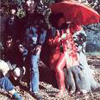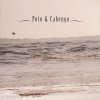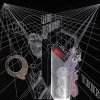 Recorded throughout the '90s and released in 1998 by Robot Records, the first proper album from The Aeolian String Ensemble is something of a mystery. Though it is attributed primarily to the work of David Kenny, the liner notes for Lassithi/Elysium also mention names like David Tibet and Steven Stapleton. Both songs bear out comparisons to music by either one, but the Ensemble's especially light touch and new age flourishes are entirely unique to them.
Recorded throughout the '90s and released in 1998 by Robot Records, the first proper album from The Aeolian String Ensemble is something of a mystery. Though it is attributed primarily to the work of David Kenny, the liner notes for Lassithi/Elysium also mention names like David Tibet and Steven Stapleton. Both songs bear out comparisons to music by either one, but the Ensemble's especially light touch and new age flourishes are entirely unique to them.
Two new shows just for you. We have squeezed out two extended release episodes for this weekend to get you through this week. They contain mostly new songs but there's also new issues from the vaults. The first show features music from Rider/Horse, Mint Field, Robert Aiki Aubrey Lowe, Anastasia Coope, ISAN, Stone Music, La Securite, Bark Psychosis, Jon Rose, Master Wilburn Burchette, Umberto, Wand, Tim Koh, Sun An, and Memory Drawings. The second episode has music by Laibach, Melt-Banana, Chuck Johnson, X, K. Yoshimatsu, Dorothy Carter, Pavel Milyakov, Violence Gratuite, Mark Templeton, Dummy, Endon, body / negative, Midwife, Alberto Boccardi, Divine. Cow in Maui from Veronika in Vienna. Get involved: subscribe, review, rate, share with your friends, send images! |



 The composer Daniel Smutny has dropped his first name for his debut album. Despite his avant garde leanings, Telehors is accessible and devoid of any scholastic tendencies. It is a nice album made up of abstract sounds and haunting melodies. It can get dull at times but overall Telehors is a highly enjoyable experience.
The composer Daniel Smutny has dropped his first name for his debut album. Despite his avant garde leanings, Telehors is accessible and devoid of any scholastic tendencies. It is a nice album made up of abstract sounds and haunting melodies. It can get dull at times but overall Telehors is a highly enjoyable experience. This is the first album from Wang Changcun, who is a member of the China Sound Unit, a group dedicated to investigating aural phenomena in various urban centers. Blurring the distinction between noise and the avant-garde, it also marks the first release of a Chinese composer by a Western label with international scope.
This is the first album from Wang Changcun, who is a member of the China Sound Unit, a group dedicated to investigating aural phenomena in various urban centers. Blurring the distinction between noise and the avant-garde, it also marks the first release of a Chinese composer by a Western label with international scope. Earth Covers Earth was the first Current 93 album I obsessed over. I acquired it not long after I found a copy of Emblems for $2.89 in a bargain bin at a record store where none of the clerks had ever heard of David Tibet or Current 93. It was a godsend. When I first heard Emblems it was like being drawn towards a black hole, and when I finally sealed my fate by listening to Earth Covers Earth I was pulled beyond the event horizon. One of the things I love about this album is the mixture of Tibet’s own lyrical songwriting, traditional tunes, and the obscure metaphysical poetry set to music. Pervaded by a vitriolic melancholy, I listen to it when I want to evoke the intermingled feelings of sadness, hope, futility, anger, joy and faith.
Earth Covers Earth was the first Current 93 album I obsessed over. I acquired it not long after I found a copy of Emblems for $2.89 in a bargain bin at a record store where none of the clerks had ever heard of David Tibet or Current 93. It was a godsend. When I first heard Emblems it was like being drawn towards a black hole, and when I finally sealed my fate by listening to Earth Covers Earth I was pulled beyond the event horizon. One of the things I love about this album is the mixture of Tibet’s own lyrical songwriting, traditional tunes, and the obscure metaphysical poetry set to music. Pervaded by a vitriolic melancholy, I listen to it when I want to evoke the intermingled feelings of sadness, hope, futility, anger, joy and faith. Like great film noir, everypiece of Murcof's puzzle is obviously manufactured and manipulated andcalculated and refined; it so completely captures a tone that I don'tmind that the sets are fake or the lighting is hyper-real.
Like great film noir, everypiece of Murcof's puzzle is obviously manufactured and manipulated andcalculated and refined; it so completely captures a tone that I don'tmind that the sets are fake or the lighting is hyper-real. Pup is another entry into the highly nuanced, subtle, and delicate world ofminimalism that at one time would have been called “ambient” but nowgoes by titles like “lowercase.” There’s too much of this sortof thing for me to be able to stay abreast of, but Dan Abrams’ work asFenton is solid and enjoyable.
Pup is another entry into the highly nuanced, subtle, and delicate world ofminimalism that at one time would have been called “ambient” but nowgoes by titles like “lowercase.” There’s too much of this sortof thing for me to be able to stay abreast of, but Dan Abrams’ work asFenton is solid and enjoyable. In an attempt to Google up some information about this new project from Jens Massel (previously known for his work as Kandis & Senking) and Michael Cramm, I learned that the original Poto & Cabengo were a pair of identical twin girls—real names Grace & Virginia Kennedy—who spoke to each other in their own secret language for the first decade of their lives. What this has to do with this record is a mystery to me, but it's an interesting bit of trivia nonetheless. Interesting is a good word to describe this album which Massel & Cramm describe as their tribute to the sounds of country & folk music. While the idea of European electronic artists being influenced by American roots music may seem strange, there are precedents such as O Yuki Conjugate and Dead Hollywood Stars. Unlike those earlier examples, Poto & Cabengo tend to stick a little closer to the traditions of the genres, with plenty of pluckin' and singin' sitting alongside the pretty electronic melodies. It's an approach that works more often than not, although the latter part of the record is marred by the bizarre "Suevian Rhapsody," which features a nonsensical combination of croaked spoken vocals and a variety of dialogue samples from movies and television. This is a unique and fun release, and at a compact 36 minutes in length, it wraps up before the concept gets beaten to death.
In an attempt to Google up some information about this new project from Jens Massel (previously known for his work as Kandis & Senking) and Michael Cramm, I learned that the original Poto & Cabengo were a pair of identical twin girls—real names Grace & Virginia Kennedy—who spoke to each other in their own secret language for the first decade of their lives. What this has to do with this record is a mystery to me, but it's an interesting bit of trivia nonetheless. Interesting is a good word to describe this album which Massel & Cramm describe as their tribute to the sounds of country & folk music. While the idea of European electronic artists being influenced by American roots music may seem strange, there are precedents such as O Yuki Conjugate and Dead Hollywood Stars. Unlike those earlier examples, Poto & Cabengo tend to stick a little closer to the traditions of the genres, with plenty of pluckin' and singin' sitting alongside the pretty electronic melodies. It's an approach that works more often than not, although the latter part of the record is marred by the bizarre "Suevian Rhapsody," which features a nonsensical combination of croaked spoken vocals and a variety of dialogue samples from movies and television. This is a unique and fun release, and at a compact 36 minutes in length, it wraps up before the concept gets beaten to death. Also on the short side—but decidedly not as fun—is the third album from French musician, vocalist and poet Toog. The record is intended to be a modern variation on Poems For Lou, a book written during World War I by poet and soldier Guillaume Apollinaire who was inspired by a woman named Lou that he loved and lost in Nice before the war. In Toog's version, the role of the muse is played by actress Asia Argento, and WWI is replaced by the war and terrorism of the post-9/11 world. It's impossible for me to verify if Toog's words truly reflect these themes, as aside from two pieces that are sultrily spoken by Argento, all of the readings are in French, a language that I remember very little of from my lessons of many years ago. At least the music, which is produced by French sound artist Digiki, is generally quite nice, mixing together elements of downtempo electro & ambient with low-key pop & hip-hop, and even some hints of industrial, classical and cabaret. Given the strong poetic theme of the work, however, it's quite obvious that without some understanding of the words, listeners just won't get the full message that Toog is trying to convey in the 10 tracks on 'Lou Etendue'.
Also on the short side—but decidedly not as fun—is the third album from French musician, vocalist and poet Toog. The record is intended to be a modern variation on Poems For Lou, a book written during World War I by poet and soldier Guillaume Apollinaire who was inspired by a woman named Lou that he loved and lost in Nice before the war. In Toog's version, the role of the muse is played by actress Asia Argento, and WWI is replaced by the war and terrorism of the post-9/11 world. It's impossible for me to verify if Toog's words truly reflect these themes, as aside from two pieces that are sultrily spoken by Argento, all of the readings are in French, a language that I remember very little of from my lessons of many years ago. At least the music, which is produced by French sound artist Digiki, is generally quite nice, mixing together elements of downtempo electro & ambient with low-key pop & hip-hop, and even some hints of industrial, classical and cabaret. Given the strong poetic theme of the work, however, it's quite obvious that without some understanding of the words, listeners just won't get the full message that Toog is trying to convey in the 10 tracks on 'Lou Etendue'.
